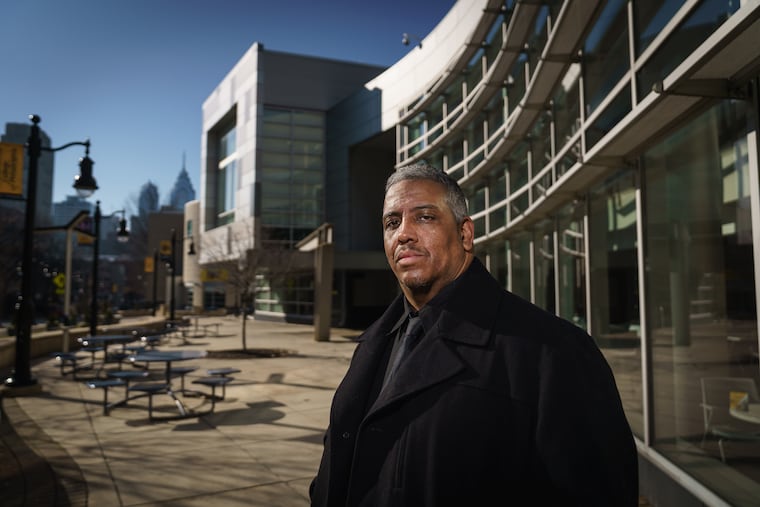He learned how to read behind bars. Now he wants other returning citizens to go to college. | Helen Ubiñas
It would be honorable work for anyone. But for Luis "Suave" Gonzales, it also serves as a testament to the possibilities of redemption.

Luis “Suave” Gonzales had been on his new job at the Community College of Philadelphia for barely two weeks and already he’d recruited about a half dozen people whose lives had been impacted by the criminal justice system to take classes.
Pa’lante — go ‘head, Suave. He’s only known one speed since being released from prison in 2017, and he’s used it to carve a path of redemption by way of radical transformation.
“If you get a second chance,” he said, “you have to do something with it.”
Gonzales, now 52, was just 17 years old when he was sentenced to life in prison back in 1986.
He could have hardly known that 31 years later he would be freed by a U.S. Supreme Court decision that declared automatic life-without-parole sentences for juveniles are unconstitutional.
An article in The Inquirer chronicled his release from Graterford State Prison, including a packed first-day-home agenda that included speaking to students and school administrators at Esperanza College and Esperanza Academy Charter School in Hunting Park.
He was accompanied by a video crew and an audio team led by journalist Maria Hinojosa, who’s had a decades-long relationship with Gonzales and whose production company, Futuro Media, created an acclaimed podcast based on his life called Suave.
The school visit, Gonzales explained at the time, was part of a wish list he first wrote down in 1995 — a dream of freedom and the chance to return “on Day One, to a school in the neighborhood where I offended to apologize.”
He’s continued to scratch items off that list as he’s turned one wish after another into reality — and added some milestones that he might not even have imagined. Gonzales cohosts his own podcast, Death by Incarceration, he’s twice been a TEDx presenter, and he was a 2018 Reimagining Reentry Fellow through Mural Arts Philadelphia.
Last month, he started a new job as the support coach for the I Am More Reentry Engagement Program at the Community College of Philadelphia, a holistic initiative that helps people impacted by the criminal justice system — including formerly incarcerated people, their loved ones, and others — access a college education with hands-on guidance and mentoring.
This would be honorable work for anyone. But for Gonzales, he also hopes it serves as a testament to the possibilities of redemption.
Despite being passed from grade to grade, Gonzales did not know how to read or write when he was incarcerated.
It was only after his release, when looking at his Social Security card, that Gonzales even realized his last name has been misspelled on court documents and news stories for years. (It’s Gonzales with an s, not a z.)
He was in the 10th grade at Thomas Edison High School when, in 1986, he and another teen tried to take a new leather jacket off a 13-year-old named Daniel Martinez. Martinez was shot and later died.
Gonzales first served his time as someone who had nothing left to lose. But then he earned his GED behind bars, and later, a bachelor’s degree through a program for incarcerated people run by Villanova University. His dreams were being realized.
And now, the man who was once told he had an IQ of 56 is helping others access the education that was once beyond his reach.
“We grew up just trying to stay alive, that’s it,” he said. “Back then, I never had nobody saying, ‘You can be this, you can be that. You will go to college.’ I never had that in my life.”
That changed after a chance encounter with Hinojosa, then a reporter at NPR, who had been invited to speak at Graterford back in 1993. A relationship that began as source and journalist would transform into one of supporter and friend. Hinojosa encouraged Gonzales to imagine a different future for himself.
“When you start seeing yourself outside of your norm, that’s when you start believing,” Gonzales told me. “My transformation did not start when I came home. I decided way before coming home was even a possibility that I wanted to be a different person, even if I was behind bars,” he said. “I invested enough time to the point where I thought, you know what, nothing is impossible.”
Gonzales concedes that not even his wildest dreams matched the life that he has now.
“If you would have told me years ago, ‘You’re going to be doing podcasts, you’re going to be nominated for an [international documentary award], you’re going to be traveling the country speaking at colleges — you’re going to be working at a college,’ I would have said, ‘You are lying. You’re selling the dream.’”
Now he’s the one selling the dream, only his achievements are proof that the dream is real.
Derrick Perkins, the director of student transition success programs at CCP, said that Gonzales understands the challenges and barriers of reentering society and how to support them. But even more valuable, he said, is that Gonzales is daily proof that people “are much more than their criminal past.”
Just last week came another example of that.
Suave, the seven-part podcast series about incarceration, redemption, and the lasting relationship between a journalist and a source, won a prestigious IDA Documentary Award in the best multi-part audio documentary or series category.
Gonzales became emotional while accepting the award during a virtual ceremony.
The win, he later said, sent the message that “you made the right decision letting a person out and giving him a second chance.”
This message is one he’s vowed to embody during every second of his second chance.